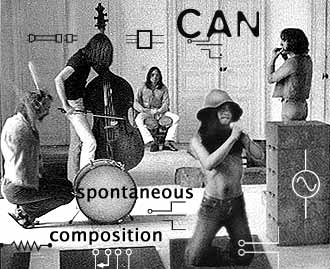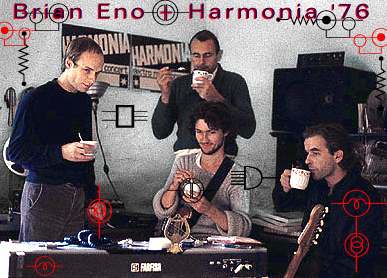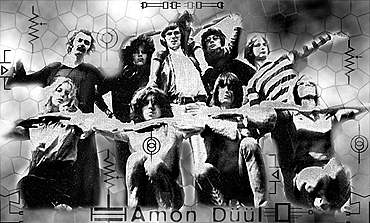D>Elektro 1.2 - |> expanded concept <|
|> Experiments | Sounds + Concepts |
| We
have played with pocket
calculators and a tiny toy-organ. We're experimenting, improvising
- you've got to stay open. We often work in a medium-like way. Sounds
come towards us, and you become a medium yourself. Everyone's doing what suits him best and knows about his weak- and strong-points. That comes automatically if you live together that long.
Ralf Huetter [Kraftwerk]
|
Anglo-American bands usually worked along the conventional way: write a couple of songs and then record them together with a producer in the shortest as possible time in a commercial studio.
And it's already here, where many German groups tried a different way, which eventually had an enormous influence on their music.
Groups like CAN, Faust and Kraftwerk had begun - even before the release of their first records - to set up their own studio - i.e. their own production facilities, trying to get as independent as possible in their production-time.
For many bands it was of the highest importance to establish a continuous exchange amongst it's members through their work / music. Producing music as a common, a shared form of living and communicating with each other.
Many groups like Faust, CAN, Amon Düül 2 and Harmonia were living and working together very closely for years. In their own houses / studios the communication and production-lines were very short. Daily work in a productive rhyhthm of one's own choosing became possible:
| "The
magic side of CAN has to do with our concept of improvisation.
You've got to stay open in the sense, that you allow the OTHERS to
play on yourself."
Michael Karoli [CAN] |
In short: It was a way of trying to realize the idea(l) of musik as communication - as the most direct form of communication. And for achieving this, you had to be able to work directly, on short notice and in your own ways. It was a kind of communication, that lead to a spontaneous form of composition, based on improvisation.
The ability of intuitively empathizing into the play of the others as well as the possibilities of your own equipment, was enabling in particular CAN - with an almost dreamlike attitude and without any pre-planning, to leave the path's of traditional composing - and to discover ever more new musical areas.

| "We
never called it 'improvising'. We had developed forms that we called
spontaneous
compositions. These forms were kind of related to each other,
but they arose spontaneously. More important than learning to play
was to learn how to hear. We've played together everyday - for years. We've created our own spiritual, communication-space, in which we could develop this kind of music."
Irmin Schmidt [CAN]
|
Also other groups like Cluster and Harmonia were practising this life-work-musicform. These musician's pioneering work in constructing sound-spaces and miniatures also attracted Brian Eno to visit them in Germany, where he, in the early 70's received some crucial influences for his own solo-work:

| "We
lived together in an old farmhouse near Hannover. There was an agreement
that if we were going to make music together, we should share our
lives together. The music should come out of the way we live, it has to be the thing that we constantly revolve around and refer back to."
Brian Eno about his work with Cluster + Harmonia
|
Short 'political'-excursion...
However, the resistance which these new forms of living and working met in the greater parts of the society, should not be forgotten. Especially the "Kommunen" (communes) of young people sharing bigger flats - [more on this point is to be found in the NEWland chapter]
Amon Düül was one of the first and well-known musician's-commune's. Despite the inevitable social repressions they were openly expressing their values, work- and lifeform towards society. They were regarding their work as much more than 'only' making music.

| We
were enabled to articulate fundamental criticism against the system,
because through our music, we had established a model of a
differnt, a counter-society."
Amon Düül 2 - self-depiction of the band; 1971
|
Of course, none of these life-work-commune's was meant / or made to last forever. But the intensity of living and working together throughout all the high's and low's, became inevitably audible in their music.
| "The
other thing I liked about them was that there was still the sense
in them of music as lived philosophy, or played
philosophy, the way you worked out your statement about things.
A lot of the German bands like CAN owned their own stuff and stayed outside the common business ways. They were taking a musical position which was the obvious outcome of a philosophical, political and social statement. I've always wanted music to be bound up with all those things - that's why I became a musician instead of a painter." |
| For
me music doesn't consist of the musical content's and 'rules' only.
Our music already begins in our normal life's. Everything we encounter and experience finds it's way into the music and - through the filters of our concsiousness - transforms into sound. That means, the way I live is the way I am making music.
Edgar Froese [Tangerine Dream]
|
|
"Kraftwerk isn't a
band in the usual sense, but an idea,
a vision, a complete philosophy of living. We are not only composing, we - with the assistance of technicians - also organize and arrange our own technology. We see ourselves as a productive team, that doesn't produce music only, but technology, videos and other things. We call that total-music. These are not just sounds, it manifest's itself in an electronic lifestyle." |
| D>Elektro |1.2.2| |>Sounds + Elements<| |
| |>Life | Work | Music <| |
| |>..Sounds + Elements..|> | |
| <| Rwd: | Sound | Factory | Trance | | |
| |> Fwd: | Studio | Sound | Laboratory | |